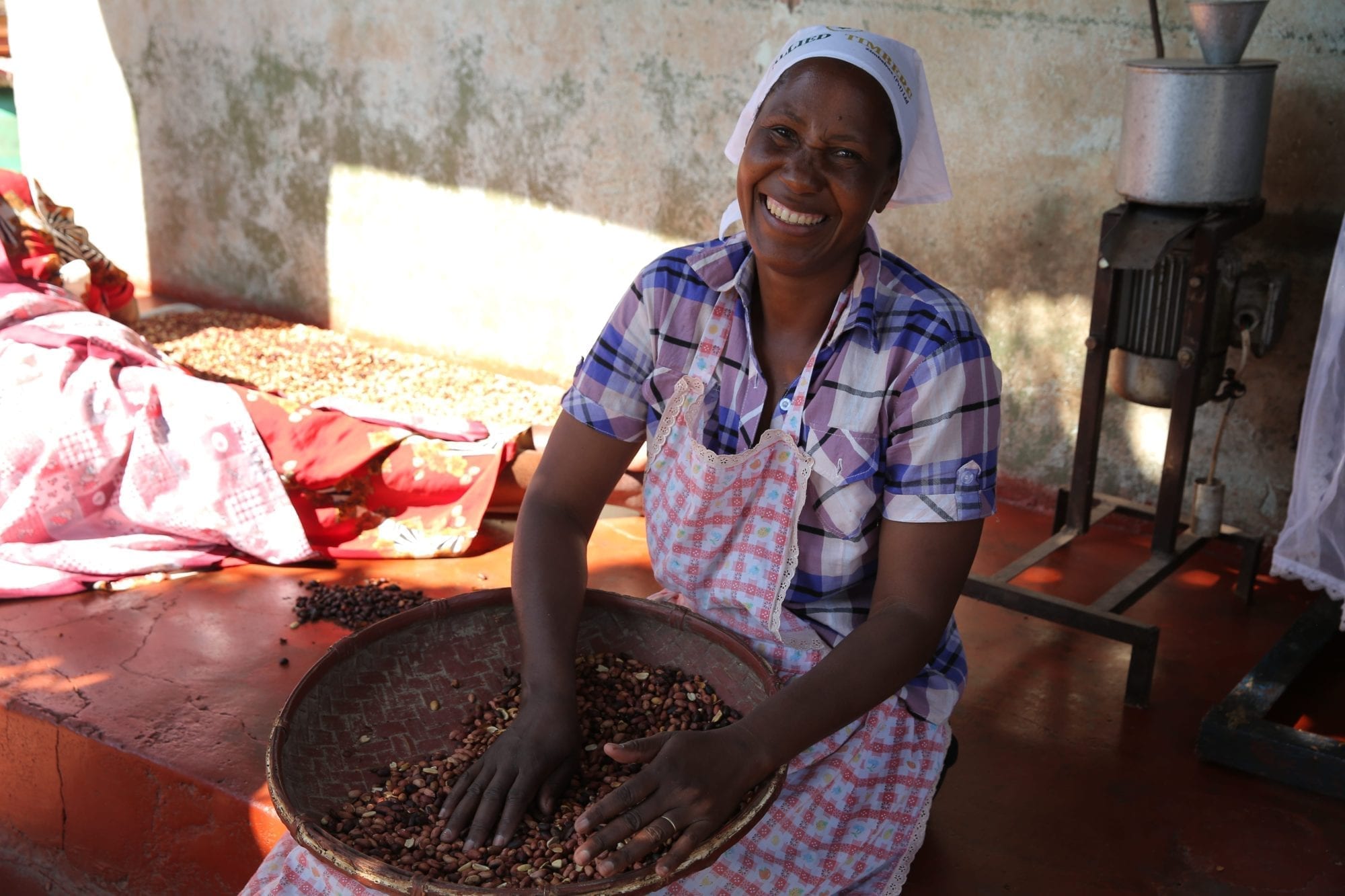
Jan 19, 2017
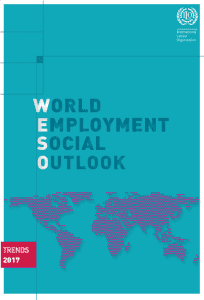
A new International Labor Organization report raises concerns about the ability of the global economy to generate sufficient jobs, improve the quality of employment and ensure that the gains of growth are shared.
“World Employment and Social Outlook: Trends 2017,” finds that disappointing economic growth predicts high unemployment and decent work deficits, including an increase in precarious work. It projects global unemployment to increase by 3.4 million workers in 2017, bringing total global unemployment to more than 201 million people.
In addition, the report’s authors warn that vulnerable employment and working poverty will remain pervasive, and that limited job opportunities and rising social discontent will continue to fuel growing rates of migration. Nearly half of workers in Southern Asia and nearly two-thirds of workers in sub-Saharan Africa were living in extreme or moderate working poverty in 2016.
In other findings:
- Deterioration of labor market conditions will be most severe in emerging countries, while chronic, poor-quality, employment will remain center stage in developing countries.
- The number of workers in vulnerable forms of employment will remain above 42 percent of total employment this year, or 1.4 billion worldwide—including almost four in five workers in developing countries. The two regions most affected will be Southern Asia and sub-Saharan Africa.
- Reductions in working poverty are slowing, endangering the prospects for eradicating poverty as set out in the Sustainable Development Goals.
- Gender disparities in labor market opportunities will persist, with vulnerable forms of employment continuing to be consistently higher for women across Africa, Asia and the Pacific and the Arab States. Meanwhile, the gender gap in hourly wages—which reaches as high as 40 per cent in some developing countries—will persist despite improvements in equal pay legislation.
Recommendations in the report include that measures addressing the causes of stagnation and structural impediments to growth be placed at the forefront of policy agendas, and that policy be focused on how to overcome structural impediments to growth—including inequality.
As the report finds: “The rights to freedom of peaceful assembly and of association are … key to the realization of both democracy and dignity, since they enable people to voice and represent their interests, to hold governments accountable and to empower human agency.”
Read the full report here.
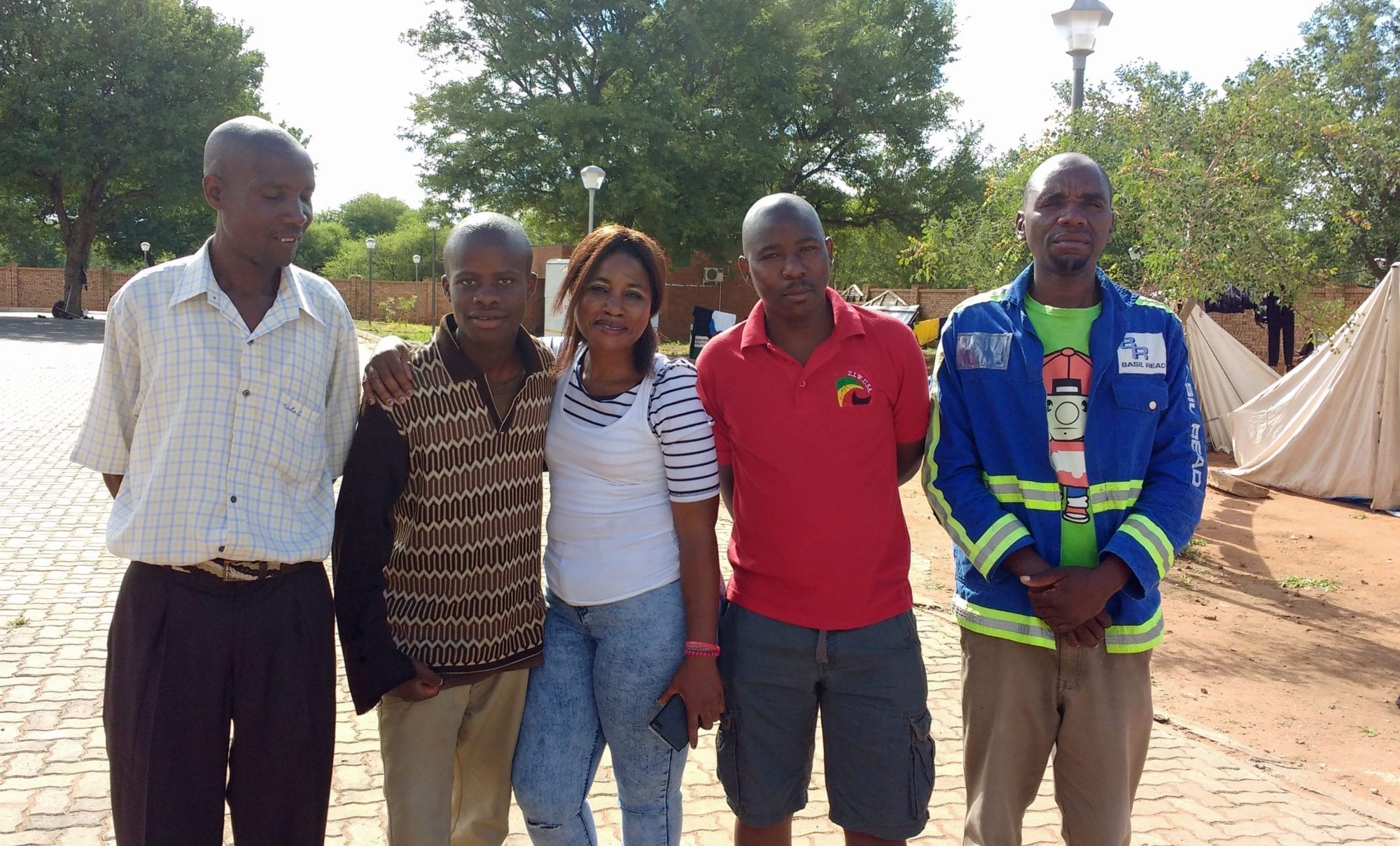
Jan 17, 2017
Edias was 12 years old when he traveled from Zimbabwe to South Africa to look for a job in agriculture. Now in his mid-twenties, he and other farm workers had been working 12 hour days, 7 days a week, and paid less than half the legal minimum wage when they asked the corporate farm owner for a raise last year.
Instead, they were assaulted and clubbed by a group of men led by the farm owner. Their homes—they lived on the farm—were burned. Edias described to Solidarity Center staff how he and four other workers were kidnapped, tortured and interrogated for hours before police arrived. (Find out how the Solidarity Center achieved justice for some of the migrant workers.)
Edias and his co-workers are among 34 million African migrants, the majority of whom are in search of decent work across borders. While an estimated 25 percent of African migrants are in Europe, the majority of migrants remain within the continent, often working in the most dangerous, unregulated jobs where they are paid little and have few rights.
Migration Conference to Address Trade Union Responses to Worker Exploitation
From January 25–27, the Solidarity Center will co-host a conference in Johannesburg, South Africa, that will bring together union leaders, migrant worker rights advocates and top international human rights officials from 22 countries and 57 organizations from around the globe to share strategies for empowering migrant workers throughout Africa.
“Achieving Fair Migration: Roles of African Trade Unions and Their Partners,” will explore best practices for asserting a worker rights agenda into national, regional and global migrant worker policies and examine tactics for strengthening cross-border and cross-regional cooperation among unions and other migrant rights organizations.
Maina Kiai, United Nations Special Rapporteur on the rights to freedom of assembly and of association, will keynote the conference and discuss findings from the landmark report his office presented to the UN last fall. “Migrants have become a massive, disposable, low-wage workforce excluded from remedies or realistic opportunities to bargain collectively for improved wages and working conditions,” according to the report.
Vame Jele, who heads up the Swaziland Migrant Mineworkers Association (SWAMMIWA), will be among some 100 conference participants. SWAMMIWA advocates for migrant workers, especially for migrant miners, truck drivers, forestry workers, domestic workers and farm workers
“Beside networking and establishing partnership with unions, organizations and associations, we aim to learn and share knowledge especially on how we can advocate,” says Jele. He also seeks to raise awareness “and call for solidarity” around the issues of former miners and their families.
Migrant miners who contract silicosis and tuberculosis from working without safety equipment are sent back to their origin countries with no support for medical care. As a result, Jele says, many former miners are dying and their families are in poverty because they have lost their primary breadwinner. SWAMMIWA last month coordinated a policy dialogue around migration issues in Swaziland and advocates to harmonize policies and regulations in the South Africa Development Community (SADC) to abolish inhumane treatment of migrant workers and involve migrant workers in union bargaining.
‘African Unions Can Take a Lead in Shaping Labor Migration Policies’
The prevalence of informal jobs and the lack of recognition of migrant worker’s status “creates opportunities for exploitation and difficulties for unions to organize and represent migrant workers,” says Caroline Mugalla, executive secretary of the East African Trade Union Confederation (EATUC), who also will participate in the conference.
“And as women migrant workers become a larger component of migration, particular challenges arise as they tend to be relegated to the informal economy, face sexual harassment and gender-based violence in the workplace more often than men, and experience nationality and gender-based economic and social discrimination in the workplace.”
The “Fair Labor Migration” conference provides a forum for African trade unionists to coordinate strategies for reaching out to and empowering migrant workers, many of whom are part of the large and growing informal economy. Participants will discuss shaping a trade union agenda against xenophobia and racism, including strategies for tackling discrimination and xenophobia in unionized and non-unionized workplaces; the challenges of organizing and addressing migrant worker exploitation in the informal sector; increasing opportunities for migrant workers to exercise their rights and access justice; and labor protections.
“African trade unions can take a lead in helping shape the global governance of migration and promoting migrant worker rights at all levels of government,” says Solidarity Center Africa Regional Director Imani Countess.
“Government officials, businesses and corporate interests have sought to ‘manage’ the movement of migrants like everyday commodities through temporary migration programs and unregulated migration flows that benefit employers at the expense of workers.” The “Achieving Fair Migration” conference will provide a forum for exploring how to enhance African labor voices in global and regional migration governance policy.
The conference, co-sponsored by the African Regional Organization of the International Trade Union Confederation (ITUC-Africa), will include regional breakouts and opportunity for discussion around area-specific migration issues and hands-on strategic workshops with concrete action plans on union cross-border cooperation, organizing migrant workers and more.
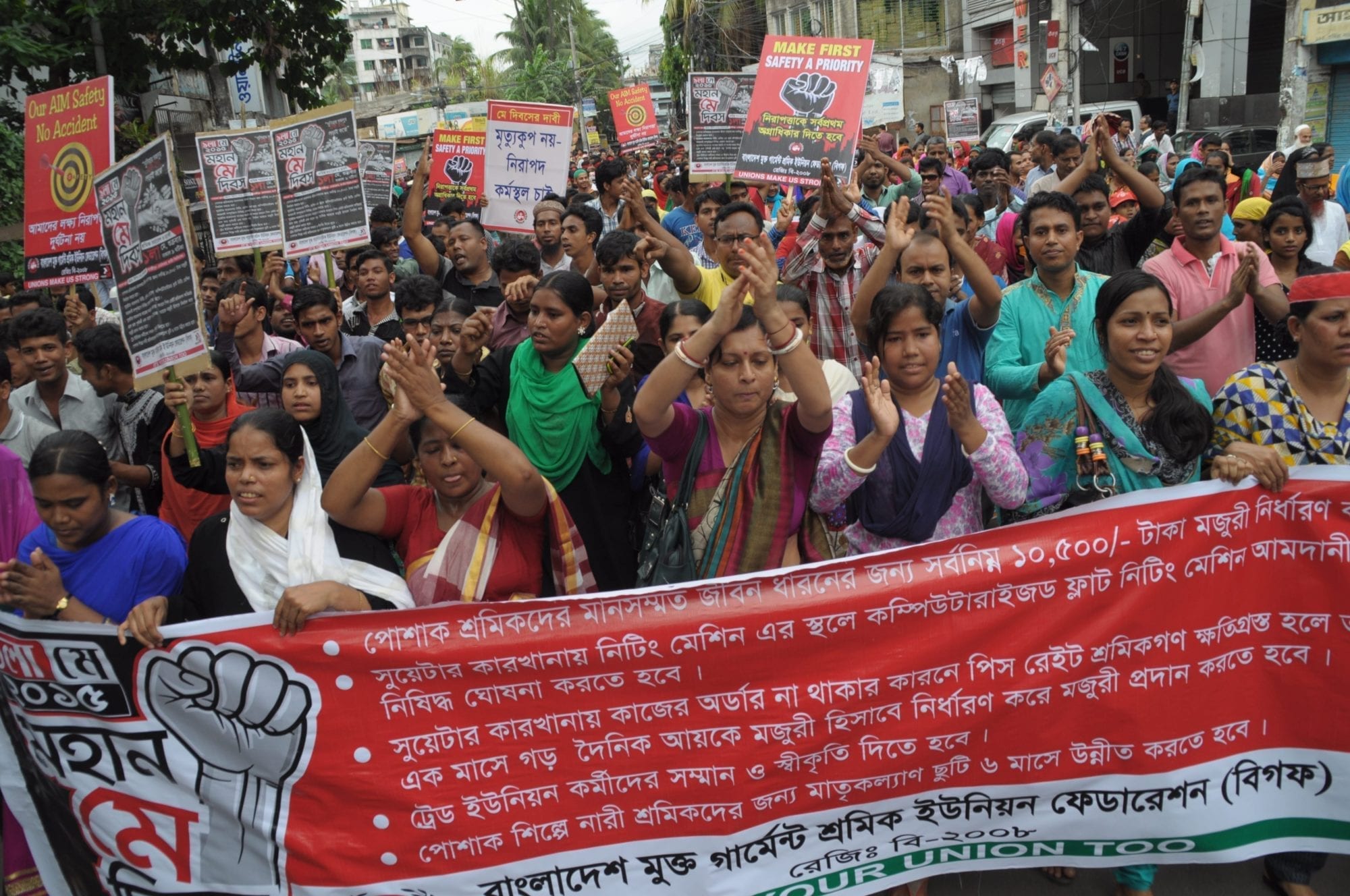
Jan 14, 2017
The Solidarity Center warns that the broad crackdown on garment workers, union leaders and worker rights activists in Bangladesh marks a troubling escalation of efforts to silence garment workers and criminalize their fundamental rights to organize, speak to power and improve their lives and livelihoods.
In a new briefing document, the Solidarity Center outlines the intimidation, arrests and firings that followed a garment worker walk-out in December. It calls on the Bangladesh government and the Bangladesh Garment Manufacturers and Exporters Association to stop the intimidation campaign; respect workers’ legal right to unionize and bargain with employers; negotiate with unions that represent workers’ interests; and raise the garment-sector minimum wage.
Since 2012, the Solidarity Center has recorded hundreds of cases of unfair labor practices, including physical attacks on union leaders, organizers and pro-union workers (and/or their families); kidnappings; threats of death and/or rape; false criminal charges; mass termination; stolen personal property; coercion; harassment; forced signing of “white papers,” that effectively increase production targets; and withholding of access to factory facilities and property (e.g., toilet, elevator).
In 2013, Bangladesh raised the minimum wage for garment workers to $68 a month, the lowest among garment workers in the region. For example, in China it is $265/month; Indonesia, $220; Vietnam, $131; India, $128; and Cambodia, $100. Bangladesh’s capital, Dhaka, is the 71st costliest city in the world, in line with Montreal, Canada.
The Bangladesh garment sector produces clothing for export, primarily to the United States and Europe. It employs nearly 5 million workers, the majority of them women.
You can defend Bangladesh garment organizers and worker-activists as they help workers who toil in unsafe factories for unfair—or unpaid—wages and who, without a union, cannot exercise their rights.
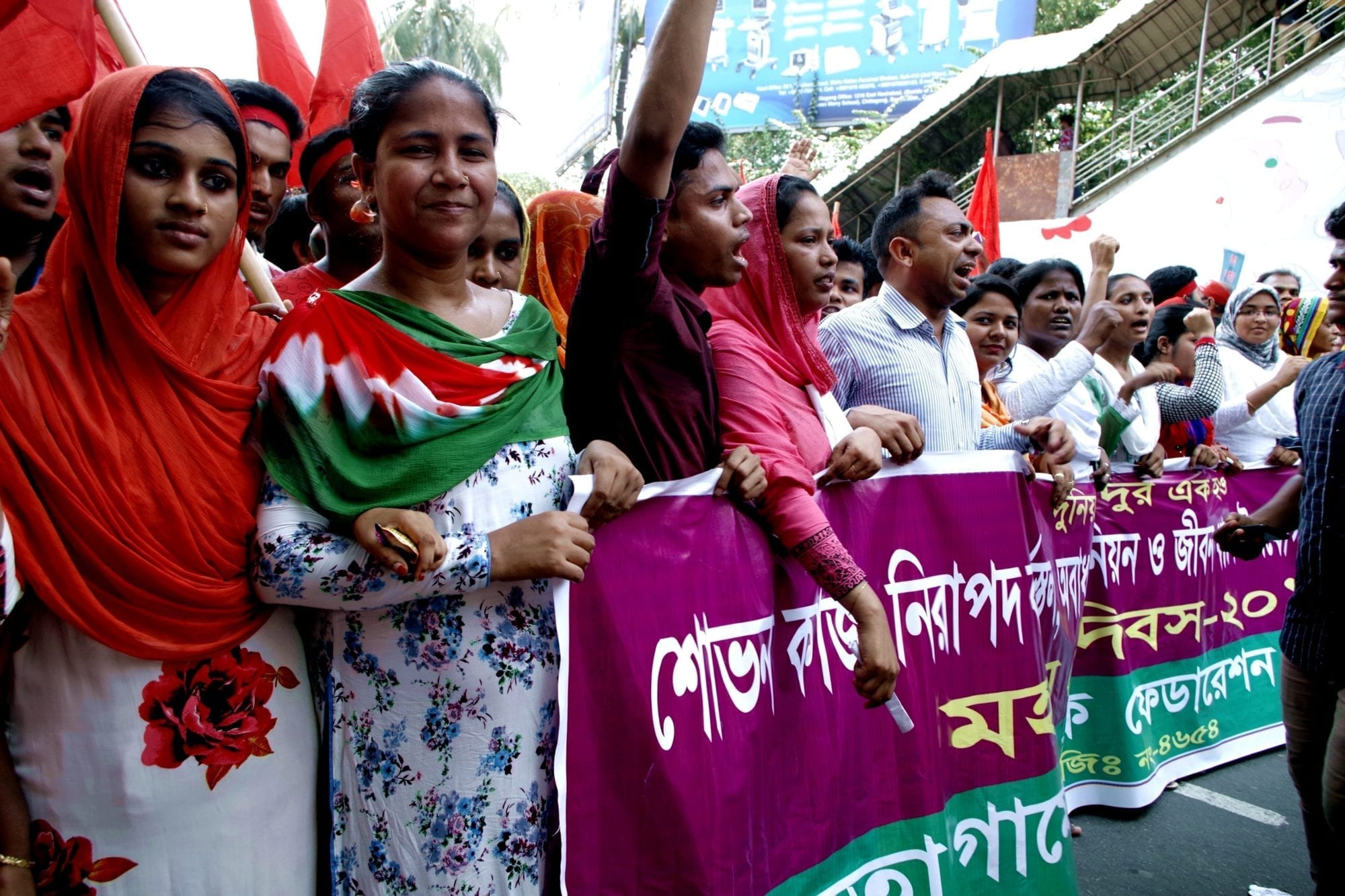
Jan 6, 2017
In mid-December, a strike in Ashulia, an industrial suburb of Bangladesh’s capital, Dhaka, and a ready-made garment sector hub, quickly snowballed into widespread unrest. Garment workers abandoned their factories to call for a living wage in response to ever-rising costs. Mass arrests and firings ensued.
The minimum wage for a Bangladeshi garment worker is $68 a month, an amount last fixed in 2013. When they took to the streets in December, workers were demanding the minimum be increased to $191 a month. Dhaka is the 71st costliest city in the world, in line with Montreal, Canada.
The strike started in Windy Apparels and rapidly spread to other units resulting in 60 factories suspending operations. On December 20, the Bangladesh Garment Manufacturers and Exporters Association (BGMEA) ordered owners to reopen factories and resume operations after a five-day break. However, upon their return, more than 1,600 workers were notified that they had been laid off due to their alleged involvement in the unrest. Labor leaders and activists collectively demanded the reinstatement of all workers but received no response.
Windy Apparels is the same factory that denied a worker sick leave in October despite a very serious illness. She collapsed on the factory floor and died upon reaching the hospital. Her body was left at the factory gate for her husband to retrieve.
Since the factories reopened, union leaders and worker rights advocates have been detained or arrested on charges related to their alleged involvement in the strike. Union activists from different federations and from different areas of Dhaka—and unrelated to the Ashulia unrest—also have been swept up by police. Many have been charged under the Special Powers Act, 1974, which provides police with sweeping power to detain individuals. The act has been used to suppress political opposition and peaceful demonstrations, as well as to retaliate against individuals engaged in personal disputes with people in positions of authority.
Journalists and nongovernmental organizations that focus on worker rights are also being targeted and intimidated by security services. Ekushey Television Journalist Nazmul Huda, was arrested on December 23 and held in police custody for two days−during which time he was allegedly tortured−on charges of inaccurate reporting on the strike.
Last week, police arrived at a community center operated by the Bangladesh Center for Workers Solidarity, an ally of the Solidarity Center, and ordered its closure.
As a result of this and the arrests of union leaders who had no role in the unrest, a chilling effect has taken hold with some other union federations closing offices even though they have not been ordered to.
International worker rights organizations, including the Solidarity Center, are monitoring the situation, and the Solidarity Center continues to track the registration of garment-sector unions in the country.
Donate now!
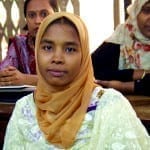
Your tax-deductible contribution to the Bangladesh Worker Rights Defense Fund will support Bangladesh garment organizers and worker-activists as they help workers who toil in unsafe factories for unfair—or unpaid—wages and who, without a union, cannot exercise their rights.
Activities your donation may support include:
• Medical care following an attack
• Safe spaces for organizers and their families who must go into hiding
• Legal assistance
• Transportation
• Awareness-raising activities regarding attacks on worker rights
• Replacement of belongings stolen during assaults
Your receipt for supporting Bangladesh organizers and activists will indicate The Solidarity Center Education Fund. The Fund is a tax-exempt charitable organization under section 501(c)(3) of the Internal Revenue Code. Your contribution is tax deductible to the extent allowed by governing laws. In addition, pursuant to the Internal Revenue Code requirement stated in Internal Revenue Service publication 1771, no goods or services were provided in return for this contribution.
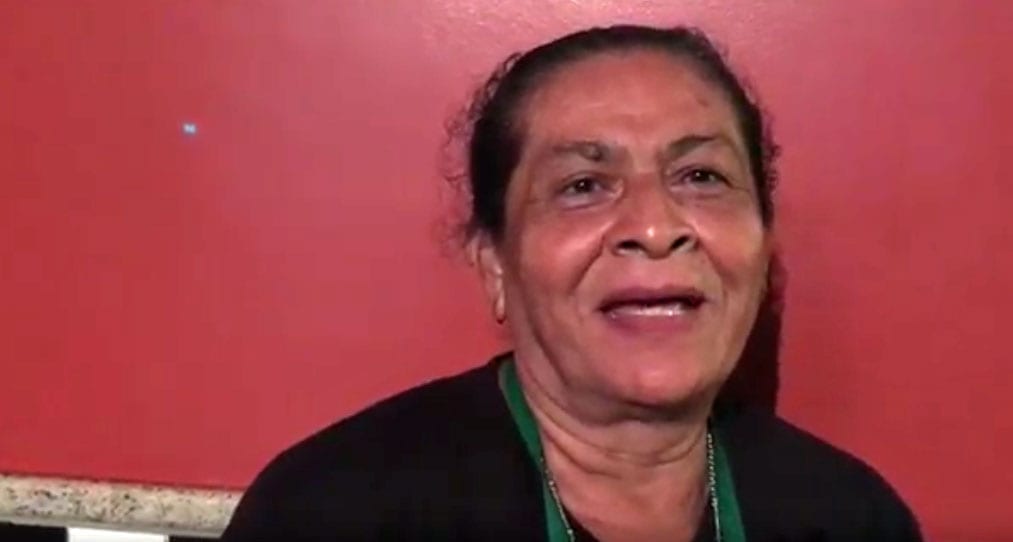
Dec 21, 2016
Esperanza Cardona, coordinator of the National Women’s Commission of La Via Campesina in Honduras, is working to end poverty through agrarian reforms and gender equality that will enable farmers to retain land rights. The organization represents two million women, 70 percent of whom live in poverty and 49 percent of whom live in extreme poverty, says Cardona.
“My name is Esperanza Cardona. I am from Honduras. I am the coordinator of the Comision Politica de Mujeres Campesinas (Policy Commission for Campesina Women). My organization is the National Women’s Commission of La Via Campesina in Honduras. It’s a mixed organization, one that fights for land rights and natural resources. We campesinos are worried about neoliberal policies that only bring us the violation of our lands and our rights, and exploitation of villages. [One such policy is] the modernization of agriculture law (approved in 1992), a law that only benefits large landholders and multinational companies … and the villages? The villages dying from hunger, poverty, malnutrition?
[In 2015], we women and our fellow campesinos, presented to the Congress a draft law on agrarian reform, food security and gender equity to replace the agriculture modernization law–which is only bringing us assassinations and discrimination. And still today, that law has yet to be considered. But we women—and the men working with us—are still fighting. And we are not going to stop confronting neoliberal policies. Latin American governments only care about money. They sell the best pasture, the best land, the best territory, and they only think about the accumulation of capital. And that’s why we women are going to keep fighting. We can’t stand any more hunger, any more poverty, any more child malnutrition, any more violations. In my country, Honduras, there’s a company that for 26 years producing corn and beans. Then one day a guy came—his name was Salvador (Savior) and expropriated their land. They brought in a lot of military. People were forcibly evicted from their land. This is the result of neoliberal policies. They are doing us great harm. This is why there is migration to the bigger cities or to countries to the north. And what do our governments do? That’s why today, I am asking women to reorganize to confront neoliberal policies. Otherwise, what are we going to do?”







